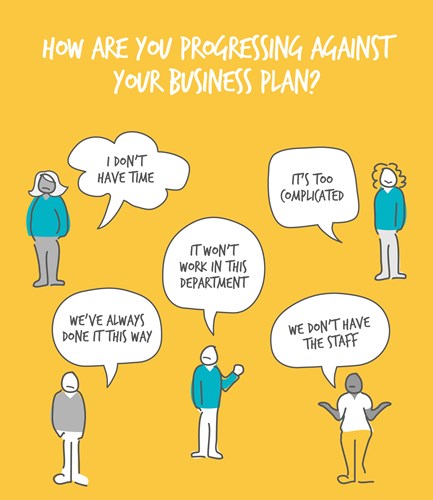Are your business reviews going to plan?

Whether local authority, private or voluntary sector, this time of year always holds significant value to your organisation.
The office is quieter than usual and several chairs sit tight to their partnering desks with a smattering of post-it note reminders in view. While some of you may be thinking, ‘Yes! One week, three days and seven hours until I’m on the beach too!’, we are thinking about something slightly different.
With quarter one in the rear-view mirror and quarter two passing at great speed, the question to ask yourself and your colleagues is - ‘How are we doing against our business plans and objectives?’
Has the enormity of the plan made it difficult to know where to start for some of your colleagues? Has the day job just got in the way? Perhaps by copying a previous approach, you’ve found that efforts just aren’t bearing any fruit? Maybe the metrics and KPIs that are in place aren’t meaningful or relevant anymore?
There are many possibilities behind why things don’t go to plan or solid results aren’t taking shape. As SME practitioners in both transformation & organisational development, ICE has been asked to co-create solutions for a whole host of different scenarios.
The commonality that appears from most of our transformative conversations is that resources are always at a premium. Taking time out to conduct an intervention is often seen as a risk or ‘impossibility’, as it will undoubtedly impact upon staff’s ability to perform their day job. However, people are appreciative of the fact that if you change nothing, nothing changes.
One size will never be fit for all purposes and therefore, our approach takes into account the differences in processes, scale, scope and the desired outcomes. Each service review is set up individually with the right people, timescales and agreed outcomes to make it a success for you. This includes ensuring enough time is reserved to allow genuine knowledge transfer, so the review delivers flourishing (not just sustainable) change in the short and long-term.
We would welcome the opportunity to speak with you directly about your plans, their scalability and what really matters to you.
To help start your discussions, we have shared three outlines of our methods to delivering change at varying scales in order to help you map out which approach is right for your situation.
Small Scale Example – Sometimes referred to as a rapid review or temperature test, this approach is used in low complexity and lower volume transactional systems that do not cross functional boundaries. Teams of staff representing end-to-end flows of work spend 1-2 days per week creating a current state map with a baseline of measures and data. This can take place in as little as 2 weeks.
Through the following envisage (future state) stage, small quick-wins are identified, along with experiments that can be contained within the team.
Action plans are used to drive progress, and are regularly reviewed to track benefits achieved.
Medium Scale Example – This approach is used in more complex and higher volume systems that often have a ‘break fix’ element. They will impact on more than one team. Teams of staff representing end-to-end flows of work spend 2 days per week creating a detailed current state picture, supported by data and performance measures. The exploratory stage takes longer - 5-6 weeks.
Through the envisage stage, experiments are identified, along with the resources required to run them successfully. These experiments often cover more than one team. Twice weekly reviews are held during the experiment to track benefits achieved. Full roll-in plans are developed, and action plans are created for larger scale changes.
Large Scale Example – This approach is used in high complexity project systems that often have high volume transactional elements within wider processes. They have significantly cross-functional boundaries. A team of staff representing end-to-end flows of work spend 2-3 days per week creating a detailed current state picture, supported by data and performance measures. The explore stage takes longer - 6-8 weeks.
Through the envisage stage, experiments are identified along with the resources required to run them successfully. These experiments often cover more than one team and can require a daily review to track benefits achieved and to unblock system conditions.
Full roll-in plans are developed and action plans are created for larger scale changes that may include restructures or significant changes to accompanying systems such as IT.
To find out more, contact Simon Platt on 0151 647 4700 or at simon.platt@icecreates.com
 collective voice
collective voice